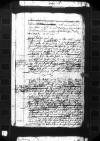List #3899
[Ioannes DANTISCUS] do UNKNOWN [possibly Mikołaj PŁOTOWSKI]Heilsberg (Lidzbark Warmiński), 1542-09-28
Regest polski:
Ubiegłego dnia Dantyszek otrzymał list podskarbiego ziem pruskich i malborskiego, swego kuma (compater), Stanisława Kostki ze Sztembarku. Świadom, że Kostka udał się już w drogę do Krakowa, Dantyszek nie odpisuje mu, korzysta jednak z okazji, by za pośrednictwem powracającego [do Malborka] posłańca pozdrowić adresata. Przekazuje także pozdrowienia małżonce Kostki [Elżbiecie z Elenborga], pannie Christinie i swojej chrześnicy.
Rękopiśmienne podstawy źródłowe:
| ||||
Tekst + aparat krytyczny + komentarzZwykły tekstTekst + komentarzTekst + aparat krytyczny
Reddidit heri superinscribed⌈heriheri superinscribed⌉
nobis is
Eamque feliciter valere optamus.

 AAWO, AB, D. 7, f. 7r
AAWO, AB, D. 7, f. 7r